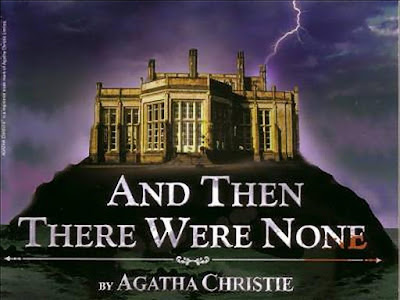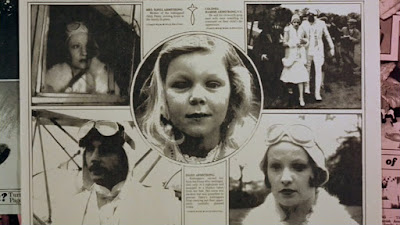I'm a huge fan of Agatha Christie since I was little. I've recently seen the BBC adaption of "And then there were none", one of my favourite AC's books and I've been compelled to write down this nonsense. I have a major degree in psychology so sometimes it takes over when I write about book/movie characters but, in this case, this crap is mostly about the fact that I enjoyed (loved - really) this adaptation- enjoy.
---
This movie is very nice adaptation. They didn’t push it, the characters are all very plausible and the tension between Vera and Phillip is almost a natural evolution of the story. I don’t really get the judge still, he is better of the one from the 1945 movie. They tried to make him a solar, witty character back in the 40s and I think it betrays the true spirit of this character.
Judge Wargrave is a hard man driven by a perverse sense of justice. He cannot be a nice companion, he has to look like he’s stern, strict and uncompromising but also trustworthy. He is - somehow - a man of honour. Wargrave is our killer but, until the very moment he kills Marston, he is
the only innocent man on the island (since his crime wasn’t a crime, he judged
guilty someone who – no matter what the proofs said – was guilty).
There are five
movies and a recent miniseries from this book: And there were none (1945 by René
Claire) B/N USA, ten little indians (1965 by George Pollock) B/N UK, And there
were none (1974 by Peter Collins) EU Color, Desijat' negritjat - (1987 by
Stanislav Govoruchin) RUS B/N, Ten Little Indians (1989 by Alan Birkinshaw) and
the BBC's and there were none (2015) but - the idea is so very incredible - there are also many homage like the CW’s
Supernatural episode from the sixth season “and then there were none” , the FOX’s Family Guy parody “ant then there
were a few” or Identity (2003, by James Mangold).
And then there were none (BBC - 2015)
promo poster
Supernatural (CW - 2010)
Season 6 episode 16
Family Guy (FOX - 2010)
Season 9 episode 01
The adaptations
are quite accurate but often opt for the piece's happy ending. The major changes
interest the finale and the setting but there are also minor ones concerning
the characters' names, the crimes committed and how they die.
Desijat' negritjat (1987)
Vera Claythorne, Philip Lombard and Henry Blore searching for Dr. Armstrong
One change
I hardly understand or like is the location.
The most
wonderful think about AC’s books is how she manages to always kill a
character in a secluded setting (a locked room, an airplain, a train stuck in the
middle of nowhere…) and make it believable. In this book, ten people are lured - under different pretences - to a tiny island known by the name of nigger island.
It is a very small island with no harbour and only a little ship reaching its
coast once a day with news and groceries. There is only one huge mansion on
the island and, except for the personnel, there is no one living there. Just this
side of claustrophobic.
Ten Little Indians (1989)
Philip Lombard's tent
It's the perfect
place to make them feel (and the readers/watchers too of course) the thrill of the
hunt when they search the all island, rock by rock, and also a sense of
protection behind the locked doors of the rooms. The isle is the eleventh
character of the story so I don’t understand why the movie from 1989 is set
during a safari. A tent flap is not a door. In this movie you completely
miss both the thrill and the false sense of protection the book has.
I love the Russian Десять негритят instead.
Desijat' negritjat (1987)
Vera Claythorne talking to Henry Blore
This movie is very nice adaptation. They didn’t push it, the characters are all very plausible and the tension between Vera and Phillip is almost a natural evolution of the story. I don’t really get the judge still, he is better of the one from the 1945 movie. They tried to make him a solar, witty character back in the 40s and I think it betrays the true spirit of this character.
And then there were none (BBC - 2015)
Judge Lawrence Wargrave promo poster
I believe
the Vera from the Russian version is the best one: she shows a rare frailty and
strong will at the same time but I don’t like the Phillip from this movie. He is strong and bold, as he is supposed to be, but his acting is too flat.
Desijat' negritjat (1987)
Vera Claythorne arguing with Philip Lombard and Henry Blore
I love
the Philip from the BBC adaptation instead. I know there are a few difference between the Philip from the book and the one from the BBC miniseries but I find this one honest and modern. Honest to himself to begin with.
And then there were none (BBC - 2015)
Philip Lombard smoking
This MR Lombard is less "victorian" and more convincing. He may have been more of a gentleman in the book but this version suits the caracter better. They are all alone in an island waiting to be slaugtered and he act like the kind of person this character is supposed to be: is a man of action, someone who lives his life fully.
Also, I don’t recall a scene with him half naked in the book but I’m hardly complaining.
Also, I don’t recall a scene with him half naked in the book but I’m hardly complaining.
And then there were none (BBC - 2015)
Philip Lombard and Vera Claythorne speaking
I really appreciate that he admit
he murdered 21 people and doesn’t flinch, that he says more than once that he rely on his instincts (and is often right). That's how I have immagined him when I read the book. As for the romance, I think it’s more lust than love.
And then there were none (BBC - 2015)
Philip Lombard and Vera Claythorne dancing
This is another thing they did wonderfully in the BBC version. There is no such a place for true
love or nice feelings here. They are monstrous people in an horrible situation
and they cope as they can. So, when Vera tries to convince Wargrave to let Lombard – already dead by her hand at the time of the
conversation - take the fall for the killings, she reveal
her true colours and I love the director/writers for this. Such an
unconventional and revealing script.
And then there were none (BBC - 2015)
Vera Claythorne shoots Philip Lombard
And, lastly,
in the Russian movie you foresee Vera shooting Lombard ,
it’s quite clear where they are going. In the BBC version there is a moment you
wander if she is really going to shoot him or you are going to watch another dull ending with them walking towards the sun holding
hands. Anyways, when she shot him and I half screamed NO and then YES. I love the
book finale in case you forgot.
And then there were none (BBC - 2015)
Vera Claythorne hanging herself
And then there were none (BBC - 2015)
Judge Lawrence Wargrave and Vera Claythorn last conversation
As soon as the episode ended, I took my laptop and I started writing this.
So here I am because "En ma Fin gît mon Commencement" - in my end is my beginning –which is the translation of the Italian title for “Endless night”, another amazing book from AC and - since she took her title from a William Blake work - I think I’ll let go of the Italian translators for quoting Mary Stuart.
Thanks for reading my nonsense.
































